Michael Easter, editor of Men's Health, professor at the University of Nevada, Las Vegas.
My first day of quitting caffeine was like a scene from Danny Boyle's Trainspotting. Imagine a grown man lying on the sofa, all wet with sweat (even though it was November), with a pounding head. I continued to have mild headaches for a whole week.
But then I began to sleep more soundly and longer, and my overall health improved, although sometimes in the morning I still wanted to drink a cup of coffee. I became less tired in the afternoon. I became less irritable when things don’t go the way I wanted. Lost several kilograms.
Caffeine is generally a wonderful thing, but it can also harm you.
How caffeine affects you depends on both your biology and how much of the drink you actually ingest. Before I decided to give it up for good, I was drinking more than three cups a day. But conversations with people smarter than me - biochemists, nutritionists, sleep experts and neurologists - led me to believe that I was overdoing it on coffee and now it was harming my health, sleep, mood and performance.
If you've been on caffeine your entire adult life, you probably don't even notice how it affects you. Start by measuring how much you drink per day, and then pay attention to your physical and mental state. If you, like me, decide that it’s time to do something about your caffeine addiction, here are some tips.
How much caffeine do you consume
90% of American adults drink caffeine every day. Recommended How much caffeine do you consume? the daily permissible dose is 300 mg. A glass of medium roast coffee from Starbucks contains 310 mg of caffeine from Pike Place Roast. And a serving of lightly fried is already 475 Blonde Roast mg. So if you drink several cups a day, by the evening you'll be ingesting nearly 1,000 mg of caffeine.
According to Caffeine: How much is too much? According to the Mayo Clinic, caffeine doses greater than 400 mg per day can cause side effects such as headaches, insomnia, stomach upset and anxiety. And at least 14% of US residents regularly take this dose.
“The exact amount of caffeine that would be definitively harmful to health is difficult to pinpoint,” says Maggie Sweeney, a researcher at the Johns Hopkins Institute of Medicine. It all depends on your lifestyle and your genes. In rare cases, large amounts of it can increase Does an energy drink cause a transient ischemic attack? the likelihood of mini-strokes (called transient ischemic attacks), when the blood supply to the brain is interrupted for a short time, says neurologist Chris Winter.
It's really strange to watch a 21-year-old guy who has already had several strokes at his age. As a rule, such people abuse energy drinks. So caffeine overdose definitely exists.
Chris Winter
When I was studying math, I consumed almost 1,200 mg of caffeine per day - every day, from 2001 to now. Its half-life is Serum Caffeine Half-lives: Healthy Subjects vs. Patients Having Alcoholic Hepatic Disease is approximately six hours. So if you take 300 mg at noon, you'll have 150 mg left in your body by 6 p.m., about 75 mg at midnight, and so on. So my body was obviously under constant influence for almost two decades.
Effect of coffee on the body
Caffeine acts as a neurostimulant. Once in the body, it stimulates processes in the cerebral cortex and enhances mental activity. The average daily dose for an adult of trimethylxanthine varies from 3 to 5 g (one cup contains 2 g). The degree of onset of the caffeine effect depends on the type of nervous system and the frequency of consumption of the invigorating drink. Once in the body, the alkaloid has the following effects:
- Acts as a blocker of the neurohormone adenosine, which inhibits nerve impulses in the brain, causing lethargy and drowsiness. By suppressing receptors, it promotes concentration and reaction speed.
- Stimulates the production of adrenaline by the adrenal glands; its release is the body’s response to stressful situations. The pulse rate accelerates, the airways expand, the blood supply to the muscles increases, and their oxygen enrichment increases. Due to the higher concentration of the hormone, movement speed and physical performance improve, and there is an increase in blood pressure with hypotension.
- Affects the concentration of dopamine in the brain. The neurohormone is responsible for a feeling of well-being, happiness, and improved mood. The feeling of elation and vigor after entering the body of caffeine is the first sign of addiction to the energy stimulant. Its withdrawal has a negative impact on physical and mental well-being.
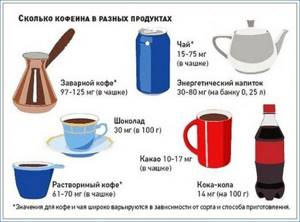
Features of the xanthine alkaloid include the ability to narrow the lumen of blood vessels. Due to this property, it is included in medications intended to relieve headaches. If the consumption of energy drinks exceeds the permissible limit and the intake of trimethylxanthine in the body is more than 10 grams, there is a risk of caffeine withdrawal syndrome, which will make itself felt approximately a day after the last cup of coffee.
What are the side effects?
I realized that I was overusing caffeine after talking with Trevor Kashy, a professional nutritionist with an extensive practice and a PhD in biochemistry. His patients, at the beginning of treatment (and he treats both completely ordinary people and Olympic athletes), completely give up coffee for two weeks: thus Kashi finds out the power of caffeine's effect on stomach upset, sleep problems, bloating or lethargy. According to Kasha and Sweeney, coffee is a strong gastrointestinal irritant.
Caffeine blocks the action of adenosine, a chemical naturally produced in the brain that helps the body fall asleep. In addition, it also causes the release of cortisol, a hormone that exacerbates the stress response and disrupts normal wakefulness and sleep patterns. So giving up caffeine leads to their improvement.
Maggie Sweeney
Numerous studies of EEG and ocular correlates of circadian melatonin phase and human performance decrements during sleep loss prove the benefits of sleep for both the mind and body. Trevor Kashi believes that these benefits outweigh all the advantages of coffee.
Chris Winter argues that improving the quality of sleep is not only beneficial in itself, but also has a beneficial effect on eating habits. This is probably why I lost several kilograms in a week after giving up coffee. The Effects of Experimental Sleep Restriction on Caloric Intake and Activity Energy Expenditure study published in 2013 by the American College of Chest Physicians found that people who sleep poorly take in nearly 600 more calories per day than those who sleep poorly. sleeps normally at night.
When you're tired due to lack of sleep, levels of the hormone ghrelin, which triggers hunger, jump, and leptin, which signals fullness, decreases. By giving up coffee and other energy drinks, you will kill two birds with one stone: you will feel less hungry and reduce your sugar intake.
Chris Winter
Doctors Kashi and Sweeney often hear from patients that they feel more balanced after giving up coffee. According to Sweeney, the fact that coffee causes anxiety was confirmed by Caffeine abstention in the management of anxiety disorders researchers back in the eighties. And the American Psychiatric Association has officially recognized the anxiety disorder that occurs with caffeine abuse.
Recommendations for getting rid of addiction
To prevent coffee withdrawal syndrome from developing in its worst manifestations, it is necessary to overcome dependence on the energy stimulant by gradually reducing the amount of drink. A specially developed technique is recommended that will help you get rid of trimethylxanthine use. Sequencing:
- Recognition of dependence.
- Reduce consumption of caffeinated beverages until withdrawal symptoms appear (within 24 hours).
- Replacing energetically active drinks with herbal teas, hibiscus, fruit drinks, water with lemon.
- Refusal of rituals accompanied by a cup of coffee.
- Conducting a weekly detox (removal of toxins).
- If drowsiness occurs, a contrast shower is recommended.
How to quit once and for all
Trevor Kasha has a way to determine whether a patient is ready to give up caffeine. “Just tell someone to give up coffee forever and look at their face,” says the doctor. You will see a flash of existential dread. And Maggie Sweeney points out the common signs of withdrawal - headaches, fatigue and irritability - to prove to patients that they have become addicted and to convince them to finally detox.
The good news is that rejection doesn't have to be downright hard. Sweeney offers a way to gradually wean yourself off coffee. Just start mixing your regular decaf coffee drink. "If you're a heavy coffee drinker, it may take a few weeks to wean yourself off this energizing substance," she says. Drinking plenty of water or herbal tea during detox may also help.
Chris Winter found my method of simply stopping drinking coffee to be “too painful.” But I found it more effective. Trevor Kashi, on the other hand, agreed with me: “You spend one weekend with herbal tea and aspirin, but then you’ll be clean,” he said. I'm glad I finally quit coffee. And now I see how my life without him becomes much better.
Withdrawal syndrome
In moderate portions, the benefits of drinking coffee are beyond doubt:
- the condition of blood vessels improves;
- the body's resistance to infections increases;
- intestinal function is normalized, toxins are eliminated;
- prevents the formation of cholesterol plaques;
- Bile is removed in a timely manner, and congestion does not form.
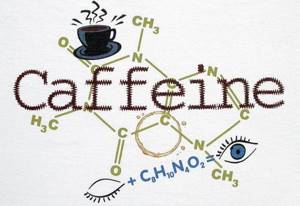
Excessive use of trimethylxanthine is addictive. An abrupt cessation of the supply of the alkaloid to the body forms caffeine withdrawal syndrome. The pathological condition is accompanied by the following symptoms:
- sleep disturbance, memory loss, chills;
- feeling of emptiness of existence;
- lack of joy, good mood;
- absent-mindedness, inability to concentrate;
- depression, headache and muscle pain;
- slight visual impairment;
- irritability, drowsiness.
Drug treatment for withdrawal symptoms is not required; symptoms will go away on their own within one week.
Slow skin aging
Caffeine slows down the rate at which your body produces collagen. It is a protein that gives your skin firmness and elasticity. As soon as its percentage decreases, your skin begins to sag and wrinkles appear. You start to age much faster. So, if you get rid of caffeine, it will help prevent the acceleration of the aging process, as well as sagging skin, which is a good thing for young women.
“Come in right away, don’t delay”: how to properly plunge into the water at Epiphany
A number of factors: a condition has been named for receiving a pension of more than 30 thousand rubles
So that Saint Gregory does not punish. Sadness and work: what not to do on January 21
Good concentration
Olivia said that while she always thought coffee gave her energy and helped her focus, it was actually quite the opposite.
“Gifts and pleasant surprises”: 3 signs for whom 2021 will be a happy year
A city in Turkey where a house for cats was built: they are comfortable and warm here
The Ministry of Digital Development of the Russian Federation will conduct an experiment to replace driver's licenses with QR codes
“Once I stopped drinking coffee, I noticed that I could focus on my thoughts and work much better,” she said.
This is because caffeine can send your thoughts into overdrive, making it difficult to concentrate on one task.
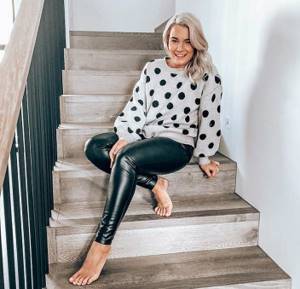
Low blood pressure
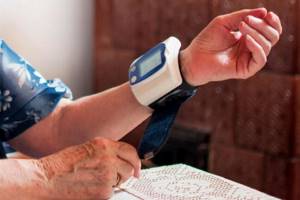
Blood pressure increases when you drink caffeine. Researchers believe this may prevent your arteries from remaining as wide as they need to be for healthy blood pressure. If you cut down on caffeine, you prevent this increase in blood pressure and the possible complications that come with it. The same goes for strong teas, as well as energy drinks and sodas, since these drinks have a very strong effect on your heart. Try to give preference to plain water, compote or freshly squeezed juices to avoid bad consequences.
US scientists classified people according to their curiosity
Hybrid aircraft engines will reduce nitrogen oxide emissions by 95%
TikTok followers support Scottish postman's song about sailors
Strong and white teeth
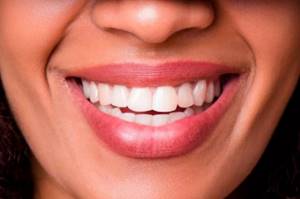
Coffee, soda, and tea are the three most common ways to get caffeine into the body. All of them can “stain” your teeth with their acidity and color. The caffeine they contain also “dries out” the liquid in the mouth, which leads to a not entirely pleasant odor. Saliva is the main defense against bacteria, so if it is not produced in the right amount, you risk damaging your teeth. Therefore, if you do drink coffee, try to consume weak coffee, or it is better to drink it with water to rinse and moisturize your mouth.
Sleep better
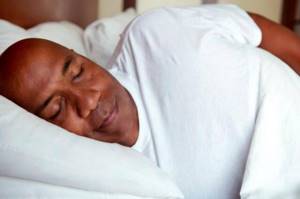
Caffeine is a common choice for stopping napping because it increases anxiety levels. Thus, it makes sense to stop drinking the drink. This will help you sleep better at night. In fact, if you drink a caffeinated drink even 6 hours before bed, it can still disrupt your sleep. Therefore, take a good look at your diet, perhaps if there is no coffee in it, everything will not be so bad?
Not ready for a family: what is known about the star of the t/s “Solar Circle” Pyotr Rykov
Not cutlets, but tenderness itself - and all thanks to a budget vegetable: recipe
What do you do at 109 years old? Zhenya Tsetskhladze takes care of a 2-year-old boy
Better absorption of nutrients
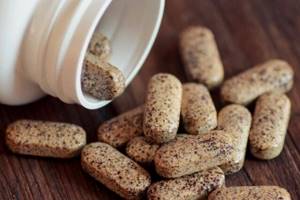
Large amounts of caffeine keep your body from absorbing vitamins and minerals well, as it shouldn't. In fact, if you take a multivitamin with your morning cup of coffee, the caffeine may prevent you from getting its benefits. Therefore, you are simply wasting your day on possibly expensive medications. You absorb them, but they are not completely absorbed by the body, which is why you will not be able to achieve the desired result. This problem is especially relevant for those who really need all the microelements from these vitamins. For this reason, if you are ill or pregnant, it is better to forget about a drink such as coffee.
New Nissan Z-Car: prototype and price (photo)
How to Wear a Padded Jacket or Chunky Puffer Jacket and Look Effortlessly Cool
Robot disinfector and other new products for the post-pandemic world at the exhibition











